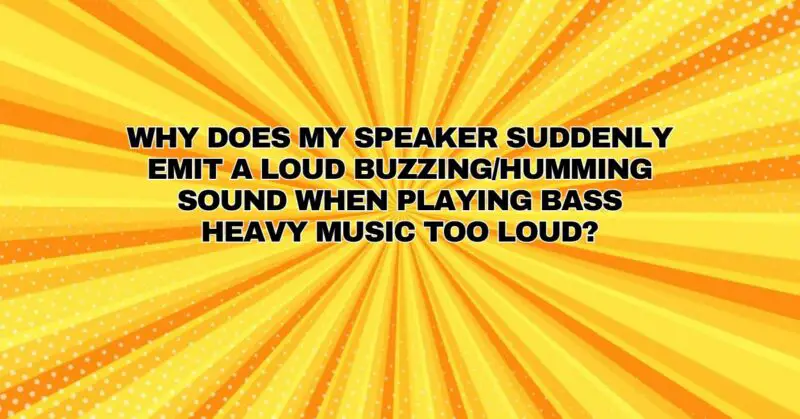The enjoyment of music and the pursuit of sonic pleasure often lead us to explore the boundaries of sound. However, there are moments when our audio systems throw us a curveball, leaving us perplexed by a sudden loud buzzing or humming sound, particularly when playing bass-heavy music at high volumes. In this comprehensive article, we will delve into the intriguing phenomenon of why speakers emit buzzing or humming sounds under these conditions, and explore the factors that contribute to this unwanted sonic disruption.
The Basics: Understanding Speaker Distortion
To comprehend why your speaker might emit a loud buzzing or humming sound when playing bass-heavy music too loudly, it’s crucial to grasp the concept of speaker distortion. Distortion occurs when a speaker reproduces sound inaccurately or introduces unwanted elements into the audio signal.
- Overloading the Speaker: Playing bass-heavy music at high volumes can push a speaker beyond its limits. When a speaker is forced to reproduce frequencies and volumes beyond its design capabilities, it can produce distorted sound.
- Mechanical and Acoustic Stress: Bass-heavy music contains powerful low-frequency vibrations that put significant mechanical and acoustic stress on a speaker’s components, including the diaphragm, voice coil, and suspension.
Common Causes of Speaker Buzzing and Humming
Now, let’s explore some common reasons for speaker buzzing and humming when playing bass-heavy music:
- Speaker Damage: Prolonged exposure to excessive bass levels can damage a speaker’s components. A damaged voice coil or torn diaphragm can result in buzzing or humming sounds.
- Amplifier Clipping: When an amplifier is pushed beyond its limits, it can enter a state known as clipping, where the output signal becomes distorted. Clipped signals can cause speakers to produce buzzing or humming sounds.
- Loose or Damaged Components: Loose speaker components, such as screws, terminals, or internal wiring, can rattle and create unwanted noises when exposed to intense bass vibrations.
- Resonance: Every speaker has a resonant frequency at which it vibrates most efficiently. If the bass-heavy music hits the speaker’s resonant frequency, it can cause excessive vibration and audible buzzing.
Preventing and Resolving Speaker Distortion
To prevent and resolve speaker buzzing and humming when playing bass-heavy music at high volumes, consider the following steps:
- Invest in Quality Equipment: High-quality speakers and amplifiers are designed to handle higher power levels and are less prone to distortion. Invest in equipment that matches your music preferences.
- Proper Gain Setting: Adjust the amplifier’s gain or volume settings to avoid overdriving the system. Clipping amplifiers are a common source of distortion.
- Use a Subwoofer: If you enjoy bass-heavy music, consider adding a dedicated subwoofer to your audio system. Subwoofers are designed to handle low frequencies efficiently and can relieve the main speakers of excessive bass duties.
- Speaker Inspection: Regularly inspect your speakers for signs of damage or loose components. If you notice any issues, address them promptly to prevent further damage.
- Room Acoustics: Room acoustics can influence speaker performance. Experiment with room treatments and speaker placement to minimize acoustic issues that may exacerbate distortion.
Conclusion: Balancing Bass and Clarity
The phenomenon of speakers emitting loud buzzing or humming sounds when playing bass-heavy music at high volumes is a reminder of the delicate balance between sonic pleasure and technical limitations. While the allure of thunderous bass is undeniable, it’s essential to equip your audio system with the appropriate components and settings to ensure that you can enjoy your music without sacrificing audio quality or risking damage to your speakers. By understanding the causes of distortion and taking preventative measures, you can strike the perfect balance between bass power and audio clarity in your listening experience.


